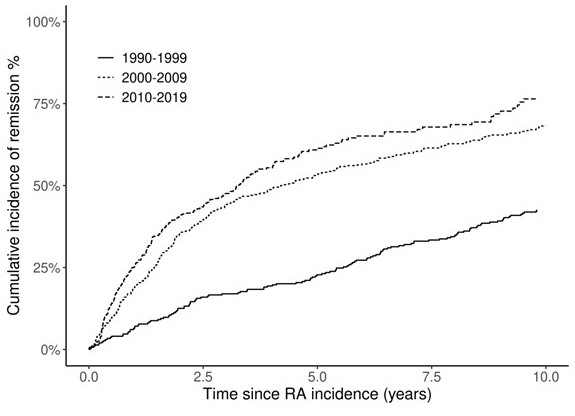Session Information
Date: Monday, October 27, 2025
Title: (1306–1346) Rheumatoid Arthritis – Diagnosis, Manifestations, and Outcomes Poster II
Session Type: Poster Session B
Session Time: 10:30AM-12:30PM
Background/Purpose: Early and aggressive treatment of rheumatoid arthritis (RA) has been linked to improved remission rates, but achieving early and sustained remission remains a challenging task. Temporal trends and risk factors for early remission have not been comprehensively studied in longitudinal population-based RA cohorts. We aimed to investigate the likelihood of achieving first remission in RA by decade of RA incidence, serostatus, and by disease modifying drug (DMARD) use.
Methods: Adult residents of a geographically defined area aged ≥18 years who met ≥4 of the 1987 ACR criteria for RA in 1980-2019 were included. All participants were followed until death, last medical contact, or 12/31/2022. Data on RA characteristics, DMARD use (i.e. conventional DMARDs, biologics, targeted synthetic DMARDs), cardiovascular risk factors and comorbidities was manually collected from the medical records. The cumulative incidence of first remission, adjusted for competing risk of death, was evaluated by decade, age, and sex. Cox models were used to examine factors associated with first remission.
Results: The study included 1,098 patients with RA (mean age 55.7, 68.4% female, 62.8% positive for rheumatoid factor (RF) and/or cyclic citrullinated peptide (CCP) antibodies). The cumulative incidence of first remission was higher in persons with RA onset in 2000-2009 and 2010–2019 vs 1990-1999, with 18.9% (95%CI 15.5-23.1%), 25.2% (95% CI 21.3-29.9%) and 6.8% (95% CI 4.4-10.3%) of patients achieving remission in the first year, respectively (Figure 1). The likelihood of first remission was higher in patients with RA onset in 2000-2009 (HR 1.75, 95%CI 1.46-2.09) and 2010-2019 (HR 1.79, 95%CI 1.48-2.17) vs 1990-1999. Risk factors associated with the likelihood of first remission included age, sex, seropositivity, baseline ESR, use of methotrexate in first year of RA, use of glucocorticoids in first year of RA, smoking status and race (Table 2). The association between BMI and remission approached statistical significance (HR per 5 unit increase 0.95, 95%CI 0.90-1.01). The risk of flare after remission was higher in 2000-2009 (HR 1.30, 95%CI 1.07-1.59) and 2010-2019 (HR 1.34, 95%CI 1.08-1.66) vs 1990-1999, and in seropositive vs seronegative patients (HR 1.41, 95%CI 1.18-1.67).Early exposure to any 2 or more DMARDs (vs 1 DMARD) increased the likelihood of first remission (HR 1.18, 95%CI 1.01-1.38).
Conclusion: The likelihood of achieving first remission in RA has improved across decades. Despite this improvement in remission rates, patients with RA in recent decades were also more likely to flare after remission. DMARD exposure and particularly early use of methotrexate enhances the likelihood of remission. Persons with seropositive and more active RA, men and older patients had higher likelihood of remission, while smoking, higher BMI and non-white race tended to decrease the likelihood of first remission.
 Cumulative incidence of remission by decade of RA incidence
Cumulative incidence of remission by decade of RA incidence
.jpg) Factors associated with remission
Factors associated with remission
To cite this abstract in AMA style:
El Hasbani G, George R, Shurtz A, Crowson C, myasoedova E. Decade-Based Trends in First Remission Among Rheumatoid Arthritis Patients: A Population-Based Study [abstract]. Arthritis Rheumatol. 2025; 77 (suppl 9). https://acrabstracts.org/abstract/decade-based-trends-in-first-remission-among-rheumatoid-arthritis-patients-a-population-based-study/. Accessed .« Back to ACR Convergence 2025
ACR Meeting Abstracts - https://acrabstracts.org/abstract/decade-based-trends-in-first-remission-among-rheumatoid-arthritis-patients-a-population-based-study/
